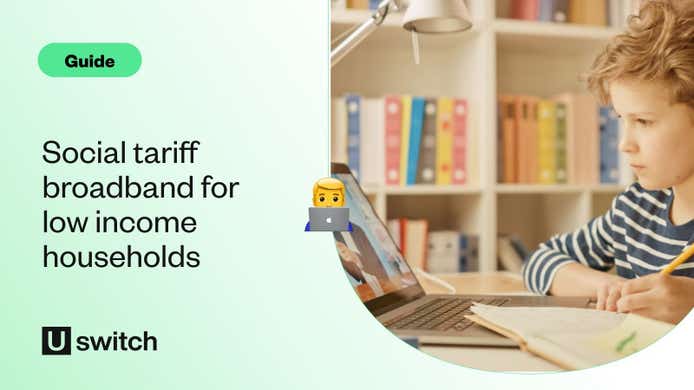With the cost of living still tightening our budgets, you might be thinking of ways you can reduce your monthly outgoings and bills.
One way you can cut your costs during the cost of living crisis is by paying less for your broadband service. There are a few things you can do to ensure that you don't overspend on your next broadband package, and even some ways you could reduce the current monthly rate you're paying.
Here are our tips on how to save money on your broadband bill.
1. Don’t pay for more than you need
Usually, the faster the broadband deal, the more expensive it will be. And the same goes for the number of extra services (like pay-TV) that are bundled into the package. If you choose a high-end, all-in broadband bundle, but then only use a fraction of the services available to you, you’ll be paying more than you need to.
So if you're approaching the end of your contract (or already out of contract) and are happy to pay for a slightly downgraded package, this can often be a good place to start.
Just keep in mind that cheaper deals often come with slower broadband speeds. And if you move onto a speed that's too slow for your household's needs, you might end up struggling to do everything you usually do online, like streaming Netflix on different devices or working from home.
To find out what broadband deal is most suited to you, you should first run a broadband speed test to see what your current internet speed is.
If you don’t have any issues with your current speed and you’re looking to save money, your next broadband deal should probably have a similar speed.
Take a broadband speed test
Run a broadband speed test to find out what speed you're currently getting, and what else could be available to you.
If you'd prefer to wait it out until you can switch to a different provider, you could well find a cheaper broadband plan for the same speed as your current one too.
Broadband packages change prices all the time to entice new customers, and many throw in vouchers that you can spend on things elsewhere. So it’s always worth shopping around for a new deal — even if you don’t want to increase your speed.
However, if you think your broadband speed is too slow right now, you may even come across a faster broadband deal for a similar price as your current contract. Many copper broadband deals are now priced the same as faster fibre ones. So if you find a faster speed that doesn't change your monthly outgoings much, it could be a good opportunity to upgrade your internet connection without spending more.
Just compare the monthly price of the deals you're browsing with your current monthly direct debit, and check all of the price details to make sure you definitely won’t be paying any extra for it.
Find cheap broadband deals
Browse our selection of low-cost broadband deals if you want to save money on your next broadband service.
2. Choose the right contract length
Broadband contract lengths can range from monthly rolling agreements, all the way to two-year commitments. Depending on your living arrangements, the length of your contract is an important factor when choosing your next broadband deal.
It can be tempting to opt for short or monthly rolling contracts if you’re renting or a student. But they often come with higher monthly fees compared to longer term contracts.
However, if you know you're moving house soon, you might have to consider what to do if you're moving home during your broadband contract. This often won’t cause many complications, and rarely leads to unexpected payments. But if your next property can’t receive the type of connection you’re currently using, you may have to deal with extra arrangements or costs.
For example, if you’re currently in contract with Virgin Media but your next property isn’t covered by its network, you may have to end your contract early and pay a termination fee.
If you don’t expect to be moving house for the foreseeable future, contract length might not be an important consideration for you. But as we mentioned, monthly prices can differ based on how long the agreement is. So be sure to check the ‘Price details’ button on our broadband deals to see the total contract cost and any setup fees.
Take a look at our moving home checklist to make sure you have everything sorted for your house move.
3. Bundle your broadband with your TV, home phone or mobile
If you already pay for other services, such as TV from Sky or BT TV or a landline, you could save money by bundling these services with one provider.
Some providers offer broadband, home phone and pay-TV services all in one plan, and Virgin Media even throws in mobile phone services too. These providers will often offer comprehensive packages that include multiple services for a single monthly payment. And they are usually much cheaper than paying separate bills for each one.
Sky, for example, will let you pay for Sky TV, Sky Broadband, and Sky Talk for a single, discounted monthly fee. That means if you have Sky TV but you currently get your broadband from another provider, you could streamline your bills by opting for a Sky TV and broadband bundle.
Broadband and TV deals
Take a look at the latest TV and broadband packages on Uswitch.
4. Watch out for price rises
To stop customers leaving early after their mid-contract broadband price increases, many providers have now added a minimum annual price increase to their T&Cs when you sign up.
If you choose one of these providers, you’ll have to agree to a yearly price increase. And unlike some other price increases, you won’t be able to leave your contract free of charge because of it.
Some providers don’t include annual price rises in their contract terms, though. But this doesn’t mean they’ll fix their prices either.
Ofcom says that you can leave your contract early for free if your provider increases its prices for a reason that isn't referenced in your contract terms when signing up. So if your provider doesn’t have mid-contract price increases built into its contract, but it still hikes your bills, you should be able to leave penalty-free.
Broadband providers with price increases in their contract terms
BT, Plusnet, TalkTalk, EE and Vodafone all have annual price increases in the T&Cs of their contract. Their rate of increase is usually a few pounds a month, but this can vary.
These price increases have historically been driven by the inflation rate which rose to around 10.5% in early 2023, where millions of customers had to swallow a record 14.4% price increase to their monthly broadband and mobile bills. The inflation rate went down to 4% in January 2024, but this still meant a sizeable price increase for many customers in.
Sky and its budget-friendly brand NOW Broadband both mention price increases in their contract terms, but not annual ones. The rate of increase isn’t specified, though.
Why are my broadband and mobile prices increasing?
Learn more about mid-contract price rises with our guide.
Broadband providers with fixed prices
Full fibre provider Hyperoptic commits to no in-contract price increases on its broadband packages. So does Trooli, Zen Internet, Voneus, Connect Fibre and more.
These providers don’t offer the cheapest broadband on the market, largely because most of them only supply full fibre. But they at least provide the peace of mind that you won’t have your prices hiked halfway through your contract.

5. Switch (or re-contract) when your plan ends
Most providers significantly increase the monthly price of your plan once your contract finishes. When you’re out of contract, the notice for changing your contract drops to just 30 days, and it also means providers can hike your monthly bills because your agreement has finished.
To make sure you don’t get stung by these out of contract price increases, broadband providers now have to send you an end of contract notification. This is a reminder that you’ll receive around 40 days before your contract finishes, letting you know you can now switch to another provider or re-contract to a new deal.
If your provider tells you it is increasing your prices at the end of your contract, you will very likely save money by switching or finding a new deal as soon as you receive your notification. Check your postcode with Uswitch to see if your next broadband deal is better suited to you and your household.
Broadband postcode checker
See what internet speeds are available and compare prices for any postcode in the UK.
Some providers let you stay on the same monthly price once your contract ends, in which case, switching may seem less urgent. But be aware that prices for new broadband deals change all the time, and new deals often include exclusive, time-limited discounts and added benefits.
So you could still find a cheaper and/or faster deal than your current one by comparing broadband packages.
When is the best time to switch broadband? Find out when to switch with our guide.
6. Choose a low income broadband social tariff
If you receive Universal Credit or another form of government financial support, you could be eligible for a low income broadband contract.
These are deals that offer the same internet speed as normal broadband packages, but for a much cheaper price. So they’re a great option if you rely on a home internet connection but need more support to afford it.
They aren’t usually available on price comparison websites, so you’ll have to enquire directly with providers to sign up for one. For more information, read our guide on broadband deals for low income families, which you can use to find many of the low income broadband deals currently on offer by UK providers.
Social tariffs for Universal Credit customers
Find out if you're eligible for a low-income broadband social tariff, and how much you could save per month.

7. Be aware of limited broadband deals
This is a pretty rare occurrence nowadays, but there are still some broadband deals out there that charge you extra for going over your data limit.
Similar to the data allowance you’ll likely have on your mobile contract, a limited broadband deal is one that imposes a cap on the amount of internet you can use per month. If you go over that cap, you’ll likely be charged extra fees depending on how much extra internet you used that month.
Thankfully, though, almost all broadband packages are unlimited now. But it’s always worth checking before you make your purchase.
On Uswitch’s deal tables, we clearly display which broadband packages are limited or unlimited. So when you’re browsing our deals, you’ll be confident about which packages may charge you for using too much internet, and which ones don’t.
8. Haggle with your provider
While haggling with your provider isn’t the most surefire way of reducing your broadband bill, it can sometimes work wonders. If you’re struggling to afford your payments or you don’t feel like you’re getting good value for money, contact your provider directly to negotiate a reduced bill, or change to another service from your provider.
Of course, you’re not guaranteed a cheaper bill by doing this. But at the very least, it will inform your provider that you have an issue with its service, and the company will hopefully do what they can to improve your experience.
Our best broadband deals
Search on Uswitch to find the right broadband package for you.




